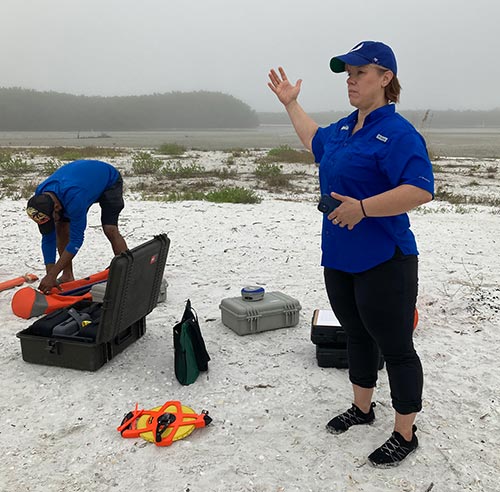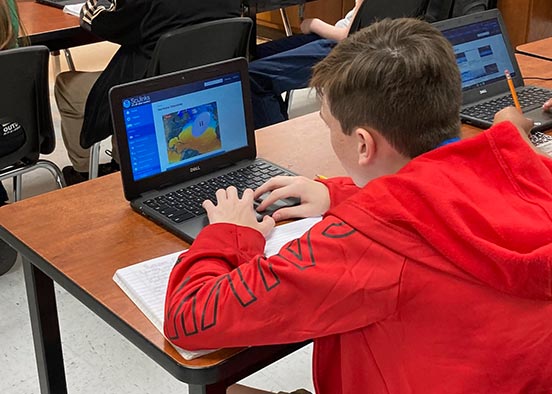Planting the seeds of environmental stewardship in a child’s consciousness early can reap lifelong benefits.
That’s why a team from The Water School at Florida Gulf Coast University has partnered with the Lee County School District to implement creative, interactive projects to get students outside to engage them in their surroundings.
Sustainable WATERS – Watershed Education for Resilience in Southwest Florida – is a training program designed to help teachers explain the impacts of climate change in Southwest Florida.

“The lessons are rooted in a big question and are action based,” said Heather Skaza-Acosta, associate professor of environmental education at FGCU. “For instance, let’s take a look at how humans are impacting the environment, and in turn, how the environment impacts humans.”
Skaza-Acosta and her team created Sustainable WATERS as an afterschool program for Collier County students in Title I schools. It has evolved to reach sixth- and seventh-grade science teachers and classrooms in Lee County Title I schools during the school day. This way, all students are exposed to the lessons and experiences, broadening their perspectives and understanding about changing climate in their own backyards.
“Activities involve critical thinking about the outcomes of climate change, how will they be affected, how will their friends and peers in other areas of Southwest Florida be affected differently, and also in a way that there would be an indirect impact,” said Regina Bale, educational outreach coordinator for FGCU’s Center for Environment and Society.
The lessons are geared toward practical application and connection, whether students are on a boat on the Caloosahatchee River or swimming at the beach. “The topics are more relatable if they can picture themselves affected,” Bale said.
Funded by the Gulf of Mexico Bay-Watershed Education and Training Program, a National Oceanic and Atmospheric Administration initiative, FGCU’s curriculum engages educators and students in meaningful watershed education experiences through strong partnerships among schools, the Conservancy of Southwest Florida and Rookery Bay National Estuarine Reserve. Lessons are meant to be built upon, year after year, incorporating data collection and analysis, community action projects and interactive indoor and outdoor activities.
Getting students outside exposes them to all kind of lessons: the impact of pollution in a puddle and where that water flows, or measuring trees to gauge age and adaptability for a changing climate, the students track data and study outcomes.
The Sustainable WATERS curriculum will grow and change with teachers’ contributions. The science teachers take various approaches to the lessons, some emphasizing technology and others incorporating art and creativity, all while journaling the lessons learned. The lessons are meant to supplement the current statewide science curriculum.
Analiese Thomas-Larocque, who teaches seventh-grade life science at Oak Hammock Middle School in Fort Myers, is part of this pioneering group.

“By utilizing the activities provided by the Sustainable WATERS program, students are better able to understand why life science is important and how it will impact them in the future, regardless of their career choice,” Thomas-Larocque said. “An example of this would be an activity where the students build their own coastline and see how sea level rise will affect Florida. Simply watching a video or discussing this concept does not have the same impact as building it themselves.”
According to Bale, there’s a transfer of knowledge through training, materials and media. “We provide news clips to help to keep children informed while validating the issues and bringing it home to them because they can relate to what they see.”
Skaza-Acosta knows the benefits of students being able to directly relate to what they see and how they engage with the activities. As part of teacher training, the team traveled to Lovers Key State Park in February to put their toes in the sand and experience firsthand how to demonstrate activities in the field.
“These opportunities provide teachers with tools and the know-how to bring these activities back to their classrooms,” Skaza-Acosta said. “The ripple effect of the education is evident, as the students are more engaged and interested in the topics.”
Bale said there is an added advantage to exposing students to the expertise of FGCU researchers: “They see The Water School professors speaking as experts in their fields, and it brings a level of prestige and importance to the research.”
The first group of teachers in the Sustainable WATERS program are providing active feedback and comparing notes, so the training modules can be adapted and modified with time as the project grows.
“The resources provided through this program have given me activities and lesson plans that I may never have used otherwise,” Thomas-Larocque said. “This gives students an opportunity to see local impacts of climate change and will hopefully give them reason to be aware of these issues throughout their lifetime.”